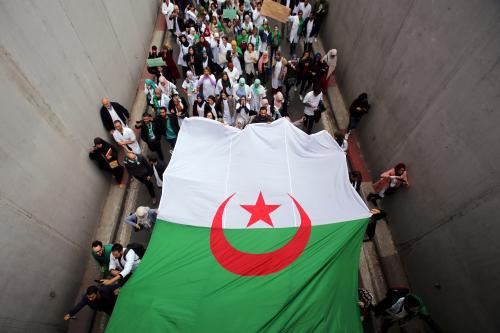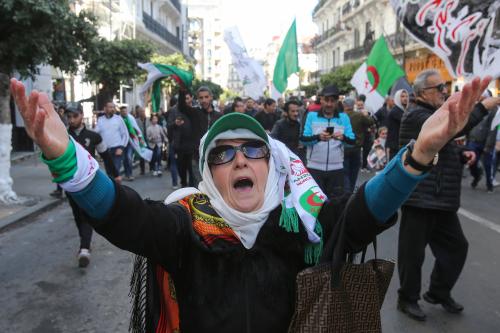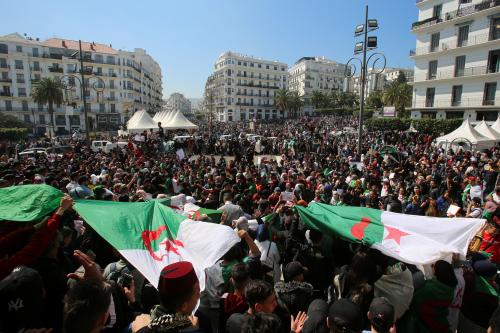Nine months since the protests in Algeria began, demands for systemic change have only grown. Sharan Grewal outlines what’s changed. This piece was originally published in the Washington Post on November 13, 2019.
Seven months after overthrowing President Abdelaziz Bouteflika, Algerians are still in the streets. Mass protests have continued every Friday since Bouteflika’s ouster in April, urging authorities to not just reshuffle the leadership but initiate a complete change of the political system.
Most scholars and observers agree that continued protests after the ouster of a dictator can put pressure on elites to follow through on commitments to democratize. However, seven months in, the Algerian regime has yet to budge, seemingly hoping for the protests to fizzle out and for non-protesters to grow tired of the demonstrations. Indeed, recent scholarship suggests that continued protests can be a double-edged sword, potentially driving non-protesters to grow frustrated not only with demonstrations but with democracy more generally.
To what extent have we seen protest fatigue in Algeria, both among protesters and non-protesters? Are each of these groups just as committed to the cause as they were back in April when Bouteflika fell?
Surveying Algeria’s uprising
A new survey of Algerians can help to answer these questions. Since April, my colleagues M.Tahir Kilavuz, Robert Kubinec, and I have been fielding an online survey in Algeria through advertisements on Facebook.
The advertisements have been shown to all Algerian Facebook users over 18 years old and living in Algeria. Clicking on the advertisement takes users to Qualtrics, where they complete a consent form and then fill out the survey. (You can read more about the methodology, and how we screen for bots or other irregularities, here.)
The Facebook sample is, of course, not nationally representative. Only about 45 percent of Algerians (19 million) are on Facebook. Compared with the general population, the Facebook sample skews wealthier, better educated and more urban.
However, compared with traditional surveys, the lower cost of surveying the Facebook population allows us to generate a much larger sample and field the survey for a much longer period of time. We have fielded the survey continuously since April 1, generating a sample of over 14,000 Algerians (including an oversampling of military personnel, excluded here). That long-term survey data permits us to trace changes over time within the Algerian Facebook population.
Measuring ‘protest fatigue’ in Algeria
The survey allows us to explore the question at hand: to what extent are Algerians still committed to the goals and tactics of the protest movement? We begin by dividing the sample into two subsets: protesters, defined as those who self-report participating in at least one protest since February, and non-protesters, who have not.
We first examine their support for the overarching goal of the movement: a complete change of the political system. In our results, we find that support for “a complete change of the political system” has actually grown over time, both among protesters and non-protesters. Among protesters, the percent who supported or strongly supported a complete change was 78 percent in April, and this has increased to 89 percent in October. Similarly, among non-protesters, support for a complete change was 64 percent in April but 74 percent in October. Nine months into the protests, there is even greater support for systemic change.
However, while the Algerian Facebook population remains committed to the protest movement’s goals, there appears to be some disillusionment with the particular tactic of protests.
From April to October, support for the protests has slightly fallen from 94 percent to 80 percent among protesters, and from 67 percent to 58 percent among non-protesters. Similarly, the percent that want the protests to continue has fallen from 93 percent to 71 percent among protesters, and from 76 percent to 58 percent among non-protesters.
It is important to reiterate that a majority of each group continues to support the protests. But there has been a slight decline over time, particularly since August.
Dwindling concessions for protesters
One way to make sense of these seemingly disparate trends is to distinguish between the goals and tactics of the protest movement. While Algerians remain committed to the goal of systemic change, there is growing doubt over whether protests will be able to achieve that goal.
At first, the weekly Friday protests were regularly met with additional concessions. Between April and July, the protests succeeded in toppling not just President Bouteflika but also his brother and adviser Said, two former prime ministers, a legendary spymaster, several prominent business executives, and other ministers and politicians. The protests, at first, seemed to be producing systemic change.
Since August, however, these concessions have become fewer and farther between. The regime has been unwilling to concede to one of the protesters’ most vocal demands: the removal of interim president Abdelkader Bensalah and Prime Minister Noureddine Bedoui, both of whom are remnants of the Bouteflika regime. Instead, the regime has tried to reimpose a road map by once again calling for a presidential election, currently slated for December with a lineup of five Bouteflika-era officials. Meanwhile, the regime has stepped up its repression of the protest movement, arresting both opposition leaders and demonstrators.
With protests winning fewer concessions, support for the tactic of protesting may have dimmed, even while support for systemic change has increased. If this trend continues, it may set the stage for some in the movement to adopt new tactics. Calls began in August for civil disobedience, potentially encompassing strikes and sit-ins beyond the transitory marches and protests. Late October then saw strikes by various labor unions and judges, while rumors have begun circulating for a general, nationwide strike as well.
In short, the protest movement shows no signs of abating. Nine months in, demands for systemic change have only grown. However, as protests struggle to achieve that goal, support may grow for complementing protests with strikes or sit-ins. But what is clear is that the regime has been unable to appease, repress or tire out the protesters.
The Brookings Institution is committed to quality, independence, and impact.
We are supported by a diverse array of funders. In line with our values and policies, each Brookings publication represents the sole views of its author(s).











Commentary
Algerians have been protesting for months. What’s changed?
November 18, 2019